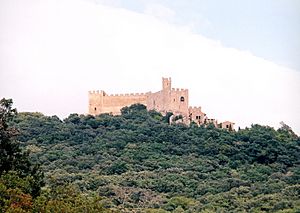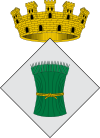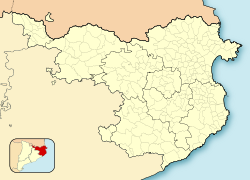La Jonquera facts for kids
Quick facts for kids
La Jonquera
|
|||
|---|---|---|---|
|
Municipality
|
|||

Panorama of the Requesens Castle
|
|||
|
|||
| Country | |||
| Community | |||
| Province | |||
| Comarca | |||
| Area | |||
| • Total | 56.9 km2 (22.0 sq mi) | ||
| Elevation | 110 m (360 ft) | ||
| Population
(2018)
|
|||
| • Total | 3,233 | ||
| • Density | 56.82/km2 (147.16/sq mi) | ||
| Demonyms | Jonquerenc, jonquerenca, jonquereño, jonquereña | ||
La Jonquera (pronounced "la joon-KEH-rah") is a small town in the Alt Empordà region of Catalonia, Spain. It is located right next to the border with France, across from the French town of Le Perthus. This makes it a very important place for travel and trade between Spain and France.
Contents
History of La Jonquera
La Jonquera has always been a key pathway through the Pyrenees mountains. An ancient Roman road, called the Via Augusta, passed through here. You can still find an altar nearby that was built by a famous Roman general named Pompey. The town's name, La Jonquera, comes from a Roman stopping point called Iuncaria.
In 1285, there was a battle in La Jonquera where French crusaders were defeated. For many centuries, from the 1200s to the mid-1800s, the town was owned by the Rocabertí family.
A very important event was the Treaty of the Pyrenees in 1659. This treaty set the new border between Spain and France right in the Albera mountain range, which greatly shaped La Jonquera's future.
Geography of La Jonquera
La Jonquera is at the northern edge of the Alt Empordà area. It sits right on the border with the Vallespir region of Northern Catalonia (which is now part of France). The Pertús Pass is the main crossing point here.
The town is nestled in the Albera Massif mountains. You'll find many cork oak forests in this area. The old village of Requesens, located east of La Jonquera, has been a protected natural site since 1986.
Major roads like the N-II and the AP-7 highway connect La Jonquera to the rest of Catalonia. These roads are part of important international routes between Spain and France.
Villages and Communities
La Jonquera is made up of the main town and four smaller communities, or "civil parishes." The village of Els Límits is special because it's right on the border with France, and it's connected to its French neighbor, Le Perthus.
| Village | Population (2005) |
|---|---|
| Canadal | 9 |
| Els Límits | 115 |
| Requesens | 0 |
| Sant Julià | 4 |
Town Shield
The shield of La Jonquera is silver and features a bundle of green reeds tied with gold. This design is a "speaking element," which means it's a picture that hints at the town's name. "Jonquera" sounds a bit like the Catalan word for "reeds." The shield is topped with a special crown that shows it's a town.
This shield was officially approved on December 17, 1990.
Interesting Places to Visit
La Jonquera and its surroundings offer many cool places to explore:
- Albera Natural Site of National Interest: A beautiful protected area in the mountains.
- Jonquera Ponds: Peaceful natural ponds.
- Exile Memorial Museum (MUME): This museum helps us remember the people who had to leave Spain during the Spanish Civil War.
- Parish Church of Santa Maria: A historic church from the late 1700s, with parts dating back to the 1400s.
- Panissars Pass: Here you can see the remains of a medieval monastery and the foundations of a large Roman building. This is where the Roman general Pompey put up trophies after winning battles.
There are also several castles that are important historical sites:
- Requesens Castle: Located in the old town of Requesens, this castle was rebuilt in the late 1800s. There's also a shrine nearby.
- Old Castle of Rocabertí: These are the ruins of a castle that was once the home of an important noble family.
- Canadal Castle: Another historic castle in the area.
You can also find ancient Romanesque chapels, which are small, old churches:
- Sant Jaume de Canadal (from the 800s)
- Sant Pere del Pla de l'Arca
- Sant Martí del Forn del Vidre (from the 900s)
- Santa Llúcia de la Jonquera
- Sant Miquel de Solans
- Sant Julià dels Torts (from the 1100s)
Other notable spots include:
- Ca l'Armet: A historic house on Carrer Major with decorated rooms and old family records.
- La Porta Catalana: A special gateway built by Josep Lluís Sert in 1982, located on the AP7 motorway.
For those interested in ancient history, there are many megalithic monuments, which are large stone structures built by prehistoric people:
- Canadal dolmen
- Dolmens of Mas Baleta I, II, and III
- Dolmens of the Estanys I, II, and III
- Dolmens of Coll de Madàs I and II
- Dolmen of the Mesclants
- Dolmen of Plan de l'Arca
- Menhirs of the Ponds I and II
Forest Fires
In July 2012, the area around La Jonquera was sadly affected by large wildfires. These fires caused a lot of damage to the forests in northern Catalonia.
Population Over Time
Here's how the population of La Jonquera has changed over the years:
| 1900 | 1930 | 1950 | 1970 | 1986 | 2007 |
|---|---|---|---|---|---|
| 1588 | 1273 | 1199 | 1964 | 2582 | 3075 |
Economy
In the past, the main jobs in La Jonquera were farming (especially crops that didn't need irrigation) and working with cork. Today, the town's economy mostly depends on the customs office at the Pertús Pass. This is because La Jonquera is right on the border, making it a busy place for goods and people crossing between Spain and France.
External linksExternal links[edit]
- Pàgina web de l'Ajuntament
- Lloc web del Consell Comarcal de l'Alt Empordà Arxivat 2010-08-27 a Wayback Machine.
- Informació de la Generalitat de Catalunya
- Informació de l'Institut d'Estadística de Catalunya
- megàlits de l'Albera
 |
 |
|||
See also
 In Spanish: La Junquera para niños
In Spanish: La Junquera para niños
 | Chris Smalls |
 | Fred Hampton |
 | Ralph Abernathy |





